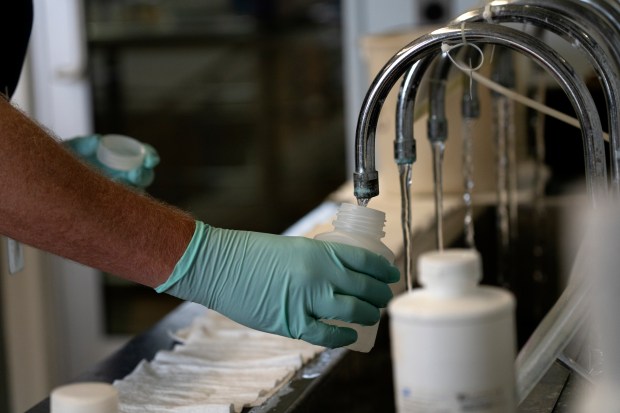Despite widespread understanding of the health and environmental damages caused by forever chemicals, manufacturers continue to win federal approval to synthesize new versions of the toxic compounds with little, if any, government oversight.
U.S. Sen. Dick Durbin wants to begin shutting off the tap by outlawing per- and polyfluoroalkyl substances, commonly known as PFAS, unless they are used in medical devices or other essential products.
Legislation introduced Thursday by the Illinois Democrat would give manufacturers a decade to phase out most uses of PFAS and eliminate air and water pollution that for now is largely released from factories without limits.
The bill also would attempt to prevent corporations from seeking protection under bankruptcy laws to avoid lawsuits seeking compensation for health damages.
“PFAS surround us,” Durbin said. “They are in the pots and pans we cook with, in our drinking water supply, in the air we breathe. We must act to ensure that harm brought on by these forever chemicals is mitigated.”
This is the latest of several measures introduced in Congress to address PFAS problems across the nation. Most likely will not make it through the Senate and House of Representatives in a period of divided government, but Durbin and other top lawmakers often manage to include their priorities in broader, must-pass legislation such as the annual budget for national defense.
Pioneered after World War II by the global conglomerates 3M and DuPont, forever chemicals have been added for decades to products featuring brand names such as Scotchgard, Stainmaster and Teflon. Industry has promoted PFAS as miracles of science, but since the late 1990s lawsuits have revealed that 3M and DuPont hid from regulators and the public what the companies knew decades ago about the harmful consequences.
PFAS are called forever chemicals because they don’t break down in the environment. Some build up in human blood, take years to leave the body and trigger testicular and kidney cancer, birth defects, liver damage, impaired fertility, immune system disorders, high cholesterol and obesity.
In 2022, a Chicago Tribune investigation revealed that more than 8 million people in the state — 6 out of every 10 Illinoisans — get their drinking water from a utility where at least one forever chemical has been detected.
President Joe Biden’s administration last week announced the nation’s first limits on six PFAS in drinking water — to date the most significant action taken by the federal government to protect Americans from the compounds, two of which the U.S. Environmental Protection Agency has concluded are unsafe at any level.
Durbin noted another 12,000 PFAS have been introduced to the marketplace during the past 70 years without thorough assessments of health risks. Scientists estimate about 600 are in production today.
Chemical manufacturers contend forever chemicals aren’t harmful. The American Chemistry Council accused the EPA last week of overstating the non-cancer risks of PFAS and of failing to prove the benefits of limiting them in drinking water outweigh the costs.
But 3M — which recently agreed to pay communities with contaminated water at least $10.3 billion and faces scores of other lawsuits — announced last year it will stop making PFAS in 2025.
Until now the federal government’s response to PFAS pollution has mostly been limited to studying it. Amid the slow response, several states have taken action to ban the chemicals in certain items, including personal care products, food packaging, firefighting foam and fabric treatments.
“Firefighters, farmers and families are demanding solutions and state leaders on both sides of the aisle are stepping up to stop use, clean up, identify safer solutions and hold polluters accountable,” said Sarah Doll, national director of the nonprofit Safer States coalition. “That said, we need all levels of government to address the crisis.”




